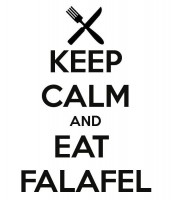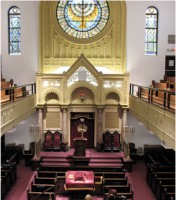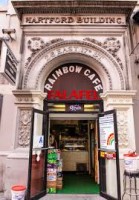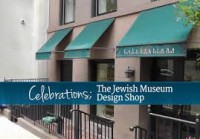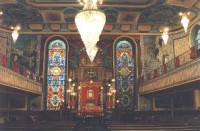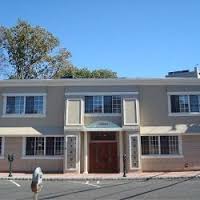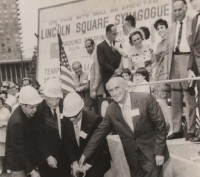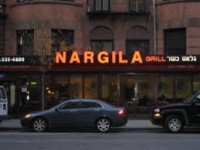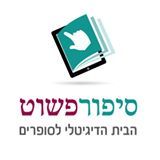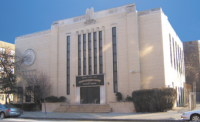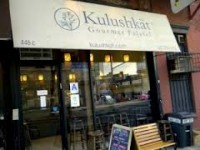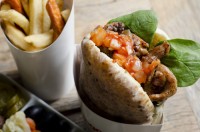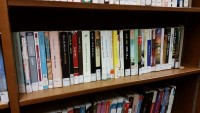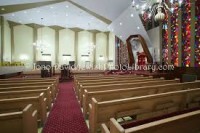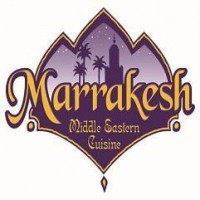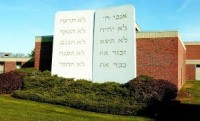PHILOSOPHY
What makes us unique?
Chickpea is the namesake of our company and at the core of our recipes. We make all of our food with only the highest quality ingredients.
We insist on baking all of our signature dishes, giving us flavorful results without adding unnecessary fats.
By using wholesome ingredients and our signature spices, we have created better cuisine that is Always Baked and Never Fried!
על המקום:
Yum- I have a newfound appreciation for baked falafel!
I'm glad I didn't read the Yelp reviews for Chickpea before going here because if I had I might have been more skeptical. I have wanted to try this place since moving in across the street a few months ago and yesterday I finally decided to head in.
The place was empty which seemed like a bad sign, but it might've just been that people were still coming home from work (it was a busy Wednesday). I decided to order the falafel platter with baba ganoush and hummus. The platter came with rice, 6 baked falafel, hummus (different flavors to choose from!), up to (4?) toppings, and hot whole wheat pita. I added feta for extra because, well, it's feta. The platter also came with a free drink- either a bottle of water or a can of soda (I got a water). I paid under $10 for all of this, which, in the city, is a friggen' bargain.
I brought my meal to Chelsea Pier to eat while I watched an outdoor movie (which I also recommend doing, btw), and it was delicious! The falafel was filling and honestly, I thought it was better than fried falafel, contrary to what everyone else is saying. Even the hummus and baba were above average, which is hard to do. Combined with the tahini sauce, rice, and feta, the falafel was incredible and filled me right up. I even had 3 falafel leftover after I was done that I still haven't eaten.
Check this place out for a quick, cheap, and healthy meal!
Congregation Ohab Zedek, or OZ, as it is fondly known, is more than just a synagogue. Under the leadership of Rabbi Allen Schwartz, the Shul is known for its open doors and big heart. OZ has broad ties with the surrounding Jewish community and its Upper West Side neighborhood as a whole. A random visitor could easily encounter an up and coming scholar from Israel, or members of the local fire station. It is an informal, comfortable, inclusive community.
OZ is a modern Orthodox congregation, but any individual is welcome, regardless of background or means. It is a Shul of interlocking communities–young families who find a relaxed setting on Shabbos morning to introduce their toddlers to services; singles, who famously crowd the steps on Friday night; and seniors, many of whom have been members of OZ for decades. It is home to those tentatively exploring Judaism as well as the most learned, who are stimulated by a broad array of lecturers and classes.
Rabbi Allen Schwartz became the spiritual leader of Congregation Ohab Zedek in 1988. He is an alumnus of Yeshiva College and received his Master of Arts Degree in Bible, Rabbinics and Halacha from Yeshiva University's Bernard Revel Graduate School, where he continues to work on his doctoral thesis on Rashi's methodology. Rabbi Schwartz was granted Smicha from the University's affiliated Rabbi Isaac Elchanan Theological Seminary. He currently holds the Raymond J. Greenwald Chair in Jewish Studies at Yeshiva University, where he has taught since 1983.
Rabbi Schwartz and his wife Alisa moved to the Upper West Side in 1985, where he served as rabbi at Congregation Ohav Shalom before moving to the pulpit at Ohab Zedek. Rabbi Schwartz's major focus at OZ is to foster connections within and among the many different age groups and constituencies of Jews living on the Upper West Side. Seeking to make all kinds of religious opportunities available to Ohab Zedek members, he brings information to the community regarding such subjects as Chesed, Tzedakah, Torah learning, Shatnes testing, Tefillin and Mezuzah service, and assistance with Mitzvah and Shabbos observance. Rabbi Schwartz's goal for the community is to make every OZ attendee a member of the larger community family.
Rabbi Schwartz gives weekly classes on a variety of subjects at OZ and also taught fifth through eighth grades at Manhattan Day School. He has lectured extensively for the Board of Jewish Education of New York at elementary and high schools in the New York area. Rabbi Schwartz has published curricula on Biblical themes for Jewish day schools nationally and has written Bible curricula for Yeshiva day schools and high schools. He serves on the executive board of the Rabbinical Council of America and has also served as President of the Council of Orthodox Jewish Organizations of Manhattan's West Side. Rabbi Schwartz was the camp rabbi and educational director of Camp Morasha from 1996 to 2000 and then served as the educational director of Camp Mesora from 2002 to 2005 and continues to dedicate time during the summer months to serve its educational staff.
Rabbi Schwartz recently completed a scholarly edition of the Commentary of the Rokeach to the Book of Proverbs.
Rabbi and Alisa Schwartz have six children and eleven grandchildren.
בקורת:
Guys,
The chicken shawarma is some of the best I've ever had. Their produce, specifically the tomatoes they put on their pitas, are always fresh. And I don't know what their hot sauce is — it's super unusual — but I have regular cravings for it. The pita is fine, but I'm weird and usually just eat everything INSIDE the pita and toss the pita, anyways.
It's also the best deal in this part of town. You should remember, however, it's cash only and there's no ATM inside!
I have literally passed by this place for over a decade and have never stepped in…until the other day.
A co worker decided to treat me to lunch and I was craving falafel, so we came here.
The two men working behind the counter were super friendly and my falafel was created very quickly. I also added cauliflower on top of it to make it really tasty. Because I'm a glutton, I also asked for a baklava as well.
My coworker handed them his card to pay, but alas, it was cash only! Fortunately I had cash, so nothing was lost.
When we went back to the office to eat, I ate the Falafel, but I must say it was pretty underwhelming. Maybe because I'm comparing it to Maoz (which makes my stomach hurt, so no more of that), but the sandwich was pretty dry. The pita was thin and overall it was just okay. The baklava was super dry, like the honey just evaporated.
I might come back and try them again…but not for a long while.
Value for money. Super fresh falafel Nicest people. Smallest restaurant EVER! Say hello to Jamal. Discuss Syria and what is going on there. Enjoy home made freshly fried falafel. Super crispy fresh salad. Spicy dressing. And a lovely warm pita. $4.50? Insane! This is a beautiful fun worthy and interesting experience. Go now!
The Jewish Museum is open today from 11 am – 5:45 pm.
Hours: Galleries
VIEW ALL
Sunday
11 am – 5:45 pm
Monday
11 am – 5:45 pm
Tuesday
11 am – 5:45 pm
Wednesday
Closed
Thursday
11 am – 8 pm
Friday
11 am – 4:00 pm
Saturday
11 am – 5:45 pm
Welcome to the Jewish Museum
The Museum maintains a unique collection of nearly 30,000 works of fine art, Judaica, antiquities, folk art, ceremonial objects, and broadcast media which reflect the global Jewish experience over more than 4,000 years. Our distinguished exhibition history reveals a deep and rich exploration of Jewish culture and identity, and includes some of the most seminal shows of the 20th and 21st centuries. Our dynamic education programs – from talks and lectures, to performances, to hands-on art making and more – serve a wide range of audiences, including families, students, educators, and art lovers.
The Jewish Museum, one of the world’s preeminent institutions devoted to exploring art and Jewish culture, from ancient to contemporary, was founded in 1904 in the library of The Jewish Theological Seminary, where it was housed for more than four decades. The Jewish Museum was the first institution of its kind in the United States and is the oldest existing Jewish museum in the world.
Judge Mayer Sulzberger1 donated the first gift of 26 objects of fine and ceremonial art to the library of The Jewish Theological Seminary with the suggestion that a Jewish museum be formed. Subsequent gifts and purchases have helped to form the Museum’s distinguished permanent collection, one of the largest and most important of its kind in the world.
In 1944, Frieda Schiff Warburg2, widow of the prominent businessman and philanthropist Felix Warburg3, who had been a Seminary trustee, donated the family mansion4 at 1109 Fifth Avenue at 92nd Street to the Seminary for use as a museum. Located along New York City's Museum Mile, and designed in the French Gothic chateau-style by architect Charles P.H. Gilbert, the original building was completed in 1908, and has been the home of the Museum since 1947.
A sculpture court was installed alongside the Mansion in 1959, and the Albert A. List Building was added in 1963 to provide additional exhibition and program space. In 1989, a major expansion and renovation project was undertaken; upon completion in June 1993, the expansion doubled the Museum’s gallery space, created new space for educational programs, provided significant improvements in public amenities, and added a two-floor permanent collection exhibition called Culture and Continuity: The Jewish Journey, which tells the unfolding story of Jewish culture and identity through 800 works of art.
Today, the Jewish Museum presents a diverse schedule of internationally acclaimed temporary exhibitions while maintaining a collection of nearly 30,000 objects reflecting global Jewish identity – paintings, sculpture, works on paper, photographs, ethnographic material, archaeological artifacts, numismatics, ceremonial objects, and broadcast media.
Weekly Shiurim:
Rav Singer Chevra Mishnayos Shiur: Daily between Mincha & Maariv
Mishna Berura Yomis: Daily after Maariv
Daf Yomi by Rabbi Fishelis: Sun – Thu at 8:00 PM
Mishlei Shiur: Sunday mornings, 7:45 AM
Women's Shiur in Tehillim: Monday
Rabbi Romm's Ha'amek Davar Shiur for men and women: Wednesday at
9 PM
Torah Topics: given by Rabbi Mayer Friedman. Friday mornings, 9:15 – 10:15 AM
Shabbos Shiurim:
Rabbi Romm–1 hour before Mincha
Daf Yomi–1 hour before Mincha
The Bialystoker Synagogue was organized in 1865 on the Lower East Side of New York City. The Synagogue began on Hester Street, moved to Orchard Street, and then ultimately to its current location on Willet Street, more recently renamed Bialystoker Place.
Our congregation is housed in a fieldstone building built in 1826 in the late Federal style. The building is made of Manhattan schist from a quarry on nearby Pitt Street. The exterior is marked by three windows over three doors framed with round arches, a low flight of brownstone steps, a low pitched pedimented roof with a lunette window and a wooden cornice. It was first designed as the Willett Street Methodist Episcopal Church.
In the corner of the women’s gallery there is a small break in the wall that leads to a ladder going up to an attic, lit by two windows. Legend has it that the synagogue was a stop on the Underground Railroad and that runaway slaves found sanctuary in this attic.
In 1905, our congregation, at that time composed chiefly of Polish immigrants from the province of Bialystok, purchased the building to serve as our synagogue. During the Great Depression, a decision was made to beautify the main sanctuary, to provide a sense of hope and inspiration to the community. The synagogue was listed as a New York City landmark on April 19, 1966. It is one of only four early-19th century fieldstone religious buildings surviving from the late Federal period in Lower Manhattan. Richard McBee and Dodi-Lee Hecht have both written in-depth articles about the building.
In 1988 the Synagogue restored the interior to its original facade, and the former Hebrew school building was renovated and reopened as The Daniel Potkorony Building. It is currently used for many educational activities. Our most recent project was the refurbishing of our windows.
The Synagogue has continued to be a vibrant and reputable force in the religious world. In recent years a substantial number of new families have chosen to make it their place for prayer and study.
Chabad of Fort Lee is founded on the principle that, while Jews embrace many levels of observance in their personal lives, there should be a place for all Jews no labels, no affiliations. They develop a sense of community and enhance the experience of being Jewish. They have successfully catered to hundreds of families from all backgrounds, offering Jewish educational programming in an accepting and innovative setting where all feel welcome. The goal is to create a positive Jewish experience for everyone as they strengthen their ties to the Jewish community.
Chabad of of Fort Lee is a place where every Jewish person is welcome – regardless of affiliation or level of knowledge. Our sole purpose is to create a warm welcoming environment to explore and experience our heritage in a non-judgmental and inviting atmosphere.
Chabad:
There's a palpable warmth at our synagogue services that melts away any embarrassment for those unfamiliar with, or new to, communal prayer.
Everyone feels at home. Come feel for yourself the family atmosphere that makes our services such a delightful experience.
Growth. Connection.
Two little words that symbolize what Chabad of Fort Lee stands for. Two big words that tell you what's so special about us.
Many people come to study or pray at Chabad. They come from all sorts of backgrounds, have many different religious affiliations, and function at all levels of Judaic observance.
But there is one thing they have in common: they are on a journey of growth – personal, intellectual, emotional, religious. They seek to expand their Jewish horizons, increase their knowledge in areas of Judaism, and for some, to grow in Jewish observance.
Warmly, gently, humorously, humbly, but persistently, our Rabbi, Rabbi Konikov, a world class Rabbi and scholar, urges everyone onward and upward, based on the teachings of Chassidism and the Lubavitcher Rebbe, Rabbi Menachem Mendel Schneersohn, that every Jew is precious and important because he is a Jew, and endowed with a G‑dly soul. One more Torah class. Try out a mitzvah. Explore your roots, take one step further on the path of Judaism; tomorrow maybe another. What when how much and how fast is up to you. But take a step forward. As long one lives one must keep on growing.
But a person, like a plant, needs warmth to grow. Our Chabad is legendary for its warmth, its friendliness, its caring, its hospitality. The words shul family are so often used here, that they've actually become a cliche. The Chabad has become the true center of our community.
The Jewish Community Center – Chabad of West Queens
Mission Statement
To assist the residents of West Queens, achieve their spiritual, physical and emotional goals through exemplary educational, religious, cultural and social programming and celebration.
To provide support in times of need, illness or emergency
To promote and strengthen Jewish awareness, pride and identity to all Jewish individuals and families regardless of affiliation or background
To provide a warm community home where everyone is made to feel welcome & comfortable.
About our Center
The JCC – Chabad LIC was created with one goal in mind – to offer all Jews, even those with little or no background – a home, and an education and memories that will inspire them for a lifetime. We strive to evoke a sense of history, love for the land of Israel, and a genuine understanding of what Judaism is all about, and thereby develop strong Jewish pride.
Our center is founded on the principle that, while people embrace many levels of observance in their personal lives, there should be a place for no labels, and all affiliations. A place where people can develop a sense of community and enhance their own spiritual experiences of Judaism.
We realize that when it comes to spirituality, it is NOT "one size fits all." We have therefore created a multifaceted program with various sub organizational departments to cater to the different needs of the many parts which comprise a community.
Each department is managed by an individual of our staff that is fully dedicated to the development and expansion of that division. We aim to ensure maximum efficiency and quality of its programming so that everyone's needs can be catered to with the appropriate attention.
Whatever department you are involved with, the trademark feeling of warmth and creative spiritual excitement flows through every program. We provide everyone with a taste of joyful Judaism according to their own specific interests, while at the same time being part of the larger community through its dynamic unifying energy of love, acceptance and commitment to non judgmental spiritual growth.
rabbi and wife.jpgAbout Rabbi Zev and Rivka
Rabbi Zev Wineberg was born in Vancouver. From the age of twelve, he started Yeshiva, traveling within Canada, USA, South Africa, Israel and Budapest.
Rivka was born and raised in Crown Heights, Brooklyn, and from a young age began volunteering in Jewish day camps throughout the US, and Ukraine. She studied in Israel and upon completion began teaching within the Chabad community.
Both knew they wanted to work within the framework of Jewish Community Service.
In 2006, with the guidance of the Lubavitcher Rebbe, of blessed memory, Rabbi Zev & Rivka Winberg were given the opportunity to expand the work of Lubavitch in West Queens, by beginning to serve the spiritual needs of the Jewish population in the up-and-coming neighborhood of Long Island City. It is a fast growing suburb – attracting many Jews. There was a need to reach out to an overwhelming population which was uncommitted and under affiliated.
Zev and Rivka came with an agenda of Ahavat Yisrael, unconditional love for every Jew, to assist, help and infuse the community with the exciting programming and Jewish experience that have become synonymous with this vital organization. Through innovative programming such as public Menorah lightings, Passover Seders, lectures and cultural events, holiday workshops for children, The JCC – Chabad LIC quickly became a household name, reshaping the landscape of the Jewish experience in West Queens.
About The LIC Synagogue
Imagine worshipping in an atmosphere of total inclusion and acceptance, where you are welcome and encouraged to ask questions, where you are implored to be as non-judgmental of your neighbors as they are of you. This is the atmosphere that has been created in this Shul which we call home. Friday night services are lively Carlebach style and followed by L'Chaim and Kugel. Shabbat services are traditional and include a Dvar Torah – contemporary Torah thought from Rabbi Zev. The weekly Kiddush is focused on celebrating milestones in the community and our families.
All Jews are welcome regardless of background, knowledge, or level.
LSS is a diverse and vibrant Modern Orthodox Congregation that provides religious, social, and educational services and outreach to the unique Jewish community of the Upper West Side. The synagogue strives to be a model in the integration of Halachic Judaism and contemporary life to the broader Jewish community.
In 1964, in the living room of an apartment in Lincoln Towers, a part-time rabbi from Yeshiva University named Steven Riskin took the budding Lincoln Square Conservative Synagogue by storm. His originality, charm and boundless energy captivated members and moved them to a more traditionally observant Judaism, in turn sparking a growing Jewish renaissance on Manhattan’s Upper West Side.
Before long, a new synagogue-in-theround made its debut at 200 Amsterdam Avenue, and the excitement at the renamed Lincoln Square Synagogue brought hundreds of young single professionals to the neighborhood, creating a vibrant scene for mixing and matching. Young families were also drawn to LSS, attracted by the dazzling teachings of Rabbi Riskin, assisted by Rabbi Herschel Cohen z”l and Rabbi Ephraim Buchwald, and the gorgeous melodies of Cantor Sherwood Goffin. “The New Orthodox” they called it on the cover of New York Magazine. Who knew? But as members struggled to navigate between the laws of Jewish tradition and the secular values of the surrounding society, Lincoln Square Synagogue began to see its destiny.
Just down the street from the temples of high culture at Lincoln Center, Lincoln Square Synagogue quickly established itself as a temple of an innovative kind, showcasing the classical and the contemporary, history and modernity. With joy and pride, the challenges of present-day living were brought into harmony with the ancient traditions passed down through the generations. The sacred liturgical texts of tefillah were infused with a new vitality as haunting, time-honored melodies shared the stage with the music of Shlomo Carlebach and The Rabbi’s Sons. The thirst for wisdom was quenched with the scholarship of Rashi and Rambam blended with the insights of 20th-century thinkers like Rabbi Abraham Isaac HaCohen Kook and Rabbi Joseph Dov HaLevi Soloveitchik. Everything old was new again.
What emerged was a synagogue with its own, unique, invigorating rhythm: home to meaningful and enthusiastic worship, to be sure, but also a place to establish lifelong friendships, build businesses and organizations, find soul mates and nourish the next generation through education and religious instruction. Thousands of Jews of all ages and backgrounds had come together to create a true makom kadosh, providing support for each other in times of sorrow and sharing joy in times of simcha. LSS was now a unified community whose commitment to Judaism and love of humankind extended beyond self and family to the world at large. You could walk in off the street for the first time, as so many did, and feel you’d been here before.
As the years flew by, the stunning success of Lincoln Square Synagogue brought with it newfound responsibility: to meet the needs of an increasingly diverse membership, an ever-expanding neighborhood and a 21st-century world. New solutions for new realities were required that would acknowledge the changing landscape, while staying true to the synagogue’s core principles and personality. Recognizing the difficulties faced by those forced to care for their children and their parents at the same time, and those older members in need of help, LSS became the first local Orthodox synagogue to add a part-time social worker to its core staff, guiding those needing support and companionship through the complicated maze of social service programs.
Identifying a resurgent thirst for Torah study on an individual, one-on-one level, LSS members founded the first full-time Modern Orthodox/Religious Zionist Kollel in the New York metropolitan area, offering the learned and the uninitiated new and exciting educational opportunities that reflected a love of Torah as well as eretz yisrael and am yisrael – the land and the nation of Israel.
And always mindful of the needs of the greater Jewish community, LSS members created the Lea Segre Tomchei Shabbos Fund providing free meals to those recovering from illness and childbirth or sitting shiva, as well as the Louis Lazar Benevolent Fund providing free religious articles like siddurim, mezuzot, and tefillin to those in need. All of this and weekly Bikur Cholim visits to Roosevelt Hospital every Shabbat afternoon, annual clothing drives, and a dedicated Chesed Fund that supports a variety of charitable causes in New York and across the country. As our sages teach, “olam chesed yibaneh” – acts of kindness build the world – and Lincoln Square Synagogue always does its part.
In 2013, LSS continued the next phase of its history and moved 100 yards south to 180 Amsterdam Avenue.
ChikChak Food Truck takes authentic Middle Eastern cuisine, and brings it right into your neighborhood. We’ve got the same Kosher menu you’ve come to love, but with double – no, triple – the convenience.
We’ve scouted some of the best locations in the city to set up shop, and you can track our progress online through your smartphone, computer, or other device. But it gets even easier to dig in: ChikChak Food Truck offers catering for events of any size. You’ll never be without your falafel fix again.
Follow along on social media as we post location updates, action shots, and tales from the mean streets of Boston. We’re on a noble mission to spread ChikChak across the city – won’t you join us?
I was hesitant to try Rami's because of the other Yelp reviews, but my brother and I gave them a shot today.
Let me just say, the kebabs and falafel are mind blowing. So, so, so good! It's as good as any falafel that we've had in Israel, if not better. The kebabs are moist and flavorful.
We ordered Rami's special, so we got a sampling of falafel, kebabs, shawarma, humus, pita and Israeli salad. The pita was hot and fresh, the humus was delicious and the shawarma was well seasoned. We also tried the Moroccan cigars which had a crisp exterior and moist, spicy beef filling. I could probably eat those three times a day. The salad provided a nice cool balance to the mix.
After ordering and eating our meal, we went back to try the baklava and were not disappointed!
The line was long, which should be expected with a good food truck. It seemed pretty clear that everybody knew where to find the best food. The wait after ordering was average. If you're planning to just pop over and grab something quick to go, it's not going to work out for you. It was probably about 20 min. from the time we got in line to when we had our food handed to us.
The prices were reasonable. This isn't McDonalds, it's authentic Israeli cuisine. Expect to pay a little more, but expect to get your money's worth. Anybody who's eaten at a kosher restaurant knows that Rami's pricing is very reasonable.
If you go to the Powder House Square location, there's plenty of space to lay out a picnic blanket or sit on park benches.
Overall it was a great food experience. If we're ever in Boston again, I know that we'll be visiting Rami's.
Enjoyed a variety of items from this food truck at the SoWa Food Truck Court. Shawarma in a pita, Moroccan cigars, and falafel balls with hummus. All were delicious and well made. Reminded me of the cuisine from my recent trip to Israel. Everyone should definitely try and track down this food truck wherever it may be in greater Boston!
Every dish on Nargila Grill's Mediterranean-influenced menu is kosher, whether it’s a rack of short ribs, a grilled salmon steak, or a lamb kebab. But that’s not the only way to feed a family: a Shabbat to Go menu lends dinner hosts a hand on Friday nights with meals that take all the performance pressure off the stove. Inside Nargila’s dining room, guests may look up to find lacy glass sconces illuminating the varying brick and coral walls that add the feel of home. Woven rugs, hookahs, and mosaic tiles fill out the decor and provide a warm touch inspired by the East. Some guests even bring along a treasure of their own—a chuppah—if they're getting married at the restaurant.
עמית מורה דרך פיננסי ואיש כספים וניהול, פרסם מספר ספרים בנושא פיננסים באמזון כולל אחד לילדים.
סיגלית גרפיקאית ואמנית פסיפס, פרסמה מספר ספרים דיגיטליים ומודפסים באמזון המלמדים פסיפס וספר צביעה, אותו עיצבה בעצמה.
יחד הקמנו את "סיפור פשוט" הוצאת ספרים דיגיטלית העוזרת לכל מי שכתב ספר או סיפור לפרסם אותו ולהיות סופר בינלאומי בצורה קלה ופשוטה.
Yoffi’s story is a love story to a magical country filled with goodness – east and west, ancient and young, small yet international – the land of milk and honey where we decided to settle and start a family company.
Yoffi represents traditional and family values, the love to our country and our link to nature, to abundance and to health. In view of these values, we produce high-quality exciting culinary gifts distributed with great love, in Israel and around the world.
Yoffi’s products are based on family recipes passing on from generation to generation, on excellent traditional flavors and on natural, nutritious raw materials, without preservatives, without color or scent additives, and Kosher (parve).
Our partners to the manufacturing process are famers, bee-hivers and family boutique factories, specializing in natural high-quality health products – made in Israel.
To integrate quality, beauty and care for the environment, and create exclusive and impressive culinary gifts, we chose to bring you Yoffi’s products in exclusively designed packages, hermetically sealed, multi-purpose and environmentally friendly.
We carved values of mutual assistance on our flag, and we are therefore proud to integrate societies employing disabled individuals in our packing processes. They do excellent work and provide our doing with great value and significance.
Yoffi’s products are tasty and exciting culinary gifts from Israel, sent to your relatives and friends in Israel and abroad. They are also memorable souvenirs from visiting the holy land. They make sure the experience will stay with you always.
It is important for us to provide you with a unique experience, from the time you purchase the product and until you taste it. Therefore, we provide you with a wide variety of ways to purchase our products, comfortably and effortlessly. We have sales points around Israel, and we sell online, on our website. We will make sure to send the gift to your hotel, to the airport, or to your home – in Israel and abroad.
We invite you to enjoy the variety, the quality and the beauty, and to carry an excellent healthy taste of Israel’s wondrous nature.
Love,
The Mayofis family
At Family company Yoffi, we provide you all the best of the land of milk and honey, a wide variety of excellent culinary products from nature – an exciting, perfect gift with wondrous tastes, health and high quality!
Yoffi’s products are served in unique, designed packs, hermetically sealed and multi-purpose. They are made in Israel with love, by carefully chosen Israeli boutique factories, specializing in high-quality natural health products.
We are proud and excited to work in cooperation with societies who employ disabled individuals, as they integrate in the production and packing processes of Yoffi products.
The products are made of natural ingredients, without preservatives and without flavor and scent additives. They are kosher .
Gazala's Story: Gazala’s Restaurant is the creation of Chef/Owner Gazala Halabi, who celebrates her culinary heritage as an Israeli Druze. Hospitality is a Druze hallmark—guests are embraced and welcomed with a flavorful meal. Says Gazala, “I want my restaurant to be a place to eat Druze food, to sample Druze culture and be treated like family. It is a little slice of my village on Columbus Avenue."
The Queens Jewish Center, also known as Queens Jewish Center and Talmud Torah or QJC, is a synagogue in Forest Hills, Queens, New York known for its significant contributions to the Jewish community. The synagogue was established by a dozen families in 1943 to serve the growing central Queens Jewish community.The current spiritual leader is Rabbi Simcha Hopkovitz.
The Queens Jewish Center building won honorable mention in the 1955 Queens Chamber of Commerce, Annual Building Awards. The architect was David Moed of Manhattan and the Builder was the LeFrak Organization.
The structure actually consists of two separate buildings. On October 3, 1946 an option was taken on the vacant plot where both Synagogue buildings now stand. Ground was first broken for the first building (also referred to as the Talmud Torah building or Bais Hamedrash building) during an elaborate ceremony on June 5, 1949, by Judge Paul Balsam and Center President Herman A. Levine. The ground-breaking for the Main Synagogue building took place on June 21, 1953 and was made possible by generous benefactor, Mr. Harry
Neighborhood
· Forest Hills was once the home of the US Open tennis tournament, played at the West Side Tennis Club before it moved to the USTA National Tennis Center in Flushing Meadows Park. When the Open was played at the tennis stadium, the tournament was commonly referred to merely as Forest Hills just as the British Open was referred to as Wimbledon.
· The neighborhood boasts a beautiful aura of old English infrastructure.
· The feeling of the neighborhood is a safe one. Conclusive for a healthy lifestyle , in mind body and spirit.
· It’s pretty picturesque scenery make it perfect surrounding for simply, better living.
· Only minutes away from the Mile long Austin street Shopping strip. As well as the large array of shopping opportunities of Queens Blvd and the boutique style antique shops of Metropolitan Ave. Truly a garden , to live in.
Kulushkät is some of the best advice we've ever gotten. It literally means 'shut up and eat,' but that's just Grandma's way of saying 'food first.'
Israeli Breakfast or Shakshuka? No need to decide! Come try both! We are OPEN for Brunch at our Prospect Lefferts location @ 11am today! 1137 Washington Ave.
From authentic falafel to juicy, flavor-infused meats, we've perfected our cooking process to offer the best tasting, healthiest quick dining experience option out there. All of our dishes are made in-house using the highest-quality raw ingredients, Mediterranean spices, and classic cooking techniques. The experience truly begins at our salad bar crafted with fresh vegetables, because we know an apple a day is not enough to keep the doctor away. When you're craving a cold drink, our freshly pressed juices will quench your thirst with greens, fruits, or a combination of both.
More of the great taste, less of the guilt.
Join us in our restaurant where nutritious meets delicious.
בקורת:
Ate here on the suggestions of other Yelp reviewers. Was not disappointed.
Had a whole wheat pita with chicken schwarma and hummus. Filled it with amazing fresh ingredients and got a side of sweet potato fries. Everything was excellent.
In fact, it was so good I went back the next day for lunch and tried the beef schwarma. Also excellent.
Can't beat it for the price.
This place was great as far as food goes. It tasted very good and it was reasonably priced. The location was convenient too! So I really liked that.
What was actually pretty cool was the wide variety of free toping you can add to your food. It makes for a different meal every time.
Another thing I really liked was the look and feel of the place. It had nice décor and it felt very unique and homey. The only complain I have about this place was the staff. They weren't very friendly and they were talking with each other the entire time. So that's the only downfall, in my opinion.
Price is extremely reasonable and food is fresh! I received my chicken schwarma on a pita with hummus piping hot, and was left to add whatever accompaniments and sauces I wanted from the salad bar. This included broccoli and cauliflower, tomatoes and red onion, tabbouleh, olives, chickpea salad, beet salad, and other Mediterranean sides. I was giddy with excitement at the prospect of not being limited to only a few toppings. After a long stretch of walking in the city, Maoz Falafel definitely hit the spot and satisfied my need for food in my belly
ספריית קווינס ברחוב מיין סטריט מכילה 8 מדפים עם ספרים למבוגרים בעברית, ומדף אחד לילדים – תמונות מצורפות
RABBI DANIEL SHERMAN
Rabbi Daniel Sherman joined West Side Institutional Synagogue in 2013. He studied at Yeshivat HaKotel in Jerusalem and then earned a BA from Yeshiva College, where he won the award for Talmudic Excellence. He earned his rabbinic ordination at the Rabbi Isaac Elchanan Theological Seminary, where he was a Maybaum Scholar as well. Prior to recieving his semicha, he interned at Congregation BIAV in Overland Park, Kansas. Rabbi Sherman is also the Co-Director of TorahLetzion, an organization that assists motivated high school students afford a gap-year in Israel. He also spent many summers at Camp Nesher serving as the Head of Staff Beit Medrash Program, chinuch Rebbi, and Assistant Athletic Director.
CANTOR ZEV MULLER
Cantor Zev Müller, our very own "Chazzan Zevi", was raised in a house of Rabbis and Chazzanim. His father, Rabbi Aron Müller, is the Rabbi of the Jewish community in Baden, Switzerland, and his uncle is the famous Cantor Benjamin Müller of Antwerp, Belgium. Chazzan Zevi studied in the renowned Ponevezh Yeshiva in Bnei Brak, Israel, and in Beth Medrash Gavoha of Lakewood, New Jersey. Zevi received his BA in Cell Biology & Neuroscience summa cum laude from Rutgers University, and his MA in Biological Sciences from Columbia University. He is currently a graduate student at the Center for Theoretical Neuroscience at Columbia University.
Cantor Müller has studied Chazzanut and voice for many years with acclaimed cantors and opera singers, and has been leading high holiday services since the age of 18. He is a Spinto Tenor with a full range and with variations of color and dynamics. Despite his young age, Cantor Müller is well regarded in the cantorial world and is often invited to perform at concerts, officiate Chuppot and daven as a guest Chazzan around the world. In 2010, Cantor Müller recited the Kel Moleh Rachamim prayer at the UN General Assembly in commemoration of the Holocaust.
Cantor Müller has been the cantor at WSIS since 2007 and has become an integral part of the shul and the community. Though well-versed in traditional Chazzanut, Chazzan Zevi has integrated more contemporary-styled music, which encourages participatory davening and singing. Chazzan Zevi has inspired many with his warm heartfelt services and attracts many locals and visitors to the synagogue.
Besides his role as Cantor, Zevi also lectures and gives shiurim on Gemara, Jewish and Halachic topics for members of the shul and the broader community. He also finds time to teach Chazzanut, Nusach and voice to adults and children. Zevi and his wife, Chaya, live on the Upper West Side.
Family owned Marrakesh serves the best authentic middle-eastern and North-African dishes in New York city. Come and try our signature couscous with lamb and seven vegetables or harrira soup. The menu is also rich with other middle-eastern kebab platters, falafel sandwiches, or Babaganoush. Marrakech Restaurant would love to help you celebrate any occasion with our unique, warm culture of fantastic hearty food, and state of the art catering service.
בקורת:
They did a pretty good job with the catering order. While the food was good, they didn't really give that large of portions for the 20 people I ordered for (I ordered enough serving size for 30 people). The food wasn't as flavorful as everyone thought it would be but there were no complaints besides that.
If I ever go here again, it will only be for the homemade lemonade, mint tea and Moroccan style biscotti. The couscous was bland and tagine not particularly impressive. I have had lovingly prepared, absolutely delicious couscous prepared by a Moroccan friend. This was a far cry from it. I am particularly peeved at the moment because I just opened the leftovers to heat up for lunch and saw that the salad was put in with the couscous. Perhaps they thought I'd eat the couscous cold with the salad? So much for my lunch of leftovers.
Young Israel: Past, Present and Future
"The aims and purposes of the organization shall be to foster and maintain a program of spiritual, cultural, social and communal activity towards the advancement and perpetuation of traditional Torah-true Judaism; and to instill into American Jewish youth an understanding and appreciation of the high ethical and spiritual values of Judaism and demonstrate the compatibility of the ancient faith of Israel with good Americanism.
The organization shall promote cooperation among the constituent branches now existing and which may hereafter be formed, establish a close bond of kinship to the end that their individual and common problems may more easily be solved, and act as the federated and central body for the Young Israel Movement so that its influence as a force in Jewry may be felt and recognized in America and the world over."
(from the Preamble of the National Council of Young Israel Constitution)
Young Israel was born in 1912, when the primary aspirations of most American-born Jews were economic success and acceptance in American society. Jewish education was very low on their list of priorities, and as a result, was usually rudimentary, at best. Orthodox synagogues were exclusively Yiddish-speaking and permeated by an Eastern European atmosphere. American-raised Jewish youth who wandered into these synagogues typically found themselves shut out completely. It is not surprising that the Jewish youth of that era generally avoided the synagogue, attending only when expected by family custom. Although intermarriage was relatively rare, the distance between young Jewish hearts and minds and Jewish belief and practice was almost huge. It was in this environment that Young Israel was founded by a group of 15 visionary young men and women.
Its first activities were Friday night lectures in English (which was very controversial) on a variety of topics of Jewish interest. Three years later, the group formed a "Model Synagogue" with innovations designed to attract American-raised English-speaking Jewish youth, including participatory singing and youth programs. To enable people of all means to fully participate in synagogue services, Young Israel prohibited the auctioning of synagogue honors. The National Council of Young Israel required the minimum halachic standards of a mechitza, closed parking facilities on Shabbat and Yom Tov, and that each of its synagogues officers be Shomer Shabbat. Young Israel synagogues popped up across North America.
Young Israel envisioned itself as much more than a conglomeration of synagogues. Young Israel was the first on secular college campuses, with over 20 kosher dining halls and intercollegiate programs. Young Israel created an Employment Bureau for Sabbath Observers, in an era when most employees were expected to work 6 days a week. At Young Israel’s headquarters in New York, arms were packed for the Haganah defense forces of the not-yet-born State of Israel. The Free Soviet Jewry Movement was championed by the leadership of Young Israel. Young Israel has always been fiercely Zionistic, and promoted the rights of Jews to live throughout the Land of Israel. Young Israel placed an important role in gaining broad acceptance for advocating for the commuting of Jonathan Pollard’s sentence.
Today the National Council of Young Israel provides professional advice and cost-saving initiatives to 135 Young Israel synagogues (and beyond), advocates for the interests and views of our 25,000 member families, trains aspiring rabbis, supports rabbis in the field with biweekly question and answer sessions, aides communities in rabbinic searches and relations, coordinates informative Gabbai2Gabbai conference calls, provides exciting Parsha Nation curriculum for synagogue youth groups, runs inspiring Achva Summer Teen Experiences, shares best practices through monthly e-publications Shul Solutions and The Practical Pulpit, runs a three division basketball league in the New York metropolitan area, and serves as the sponsor of four senior centers at Young Israel synagogues which feed, educate and recreate the generation that made Young Israel great.
Future plans include providing spiritual inspiration and connection for Young Professionals and training Ashkenazic rabbis how to serve their Sephardic congregants. We are committed to work to maximize the resources of the Jewish community by working with our colleagues at other Jewish organizations and Jewish institutes of higher education and to maintaining a standard of excellence in everything we do.

